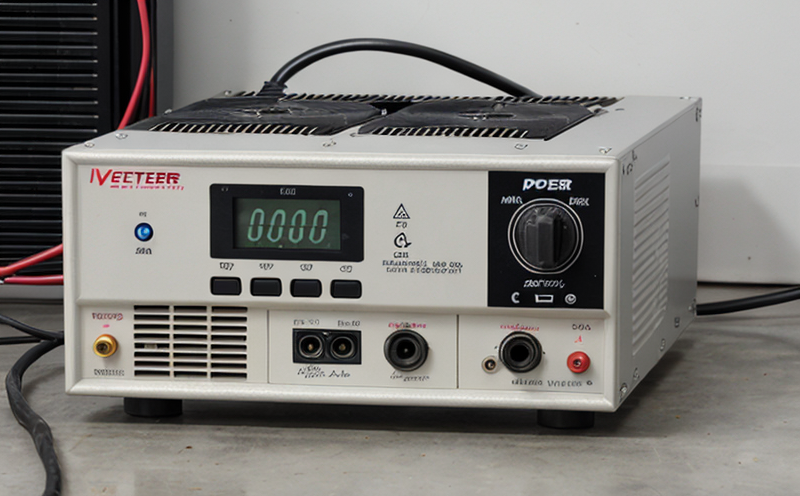IEC 60068 Environmental Stress Testing of Power Electronics
The International Electrotechnical Commission (IEC) Standard IEC 60068 sets forth a series of tests to evaluate the environmental stress resistance of electrical and electronic equipment. In this context, we focus on the application of these standards to power electronics and inverters used in renewable energy systems.
Power electronics play a crucial role in converting between different voltage levels or generating electricity from various sources like solar panels or wind turbines. As such, they must be robust enough to withstand harsh environmental conditions that can occur during their lifecycle. The IEC 60068 series of standards provides comprehensive guidance on how these components should undergo rigorous testing before being deployed in real-world applications.
Our laboratory specializes in conducting IEC 60068 compliant tests for power electronics and inverters, ensuring that our clients meet both national and international regulatory requirements. By simulating various environmental stresses such as temperature cycling, humidity exposure, altitude changes, salt spray, vibration, and more—our team ensures that your products will perform reliably under actual operational conditions.
Our testing process typically involves multiple stages: initial pre-testing inspection, setup of the test configuration based on specific IEC standards selected by the client, execution of the tests themselves, followed by thorough analysis and documentation of results. Throughout this entire cycle, our skilled technicians employ advanced instrumentation tailored specifically for measuring performance metrics during exposure to environmental stress.
For example, when testing an inverter against temperature cycling according to IEC 60068-2-13, we would first ensure that all samples are correctly prepared following manufacturer guidelines. Then using specialized ovens capable of achieving wide ranges of temperatures (-40°C up to +150°C), we subject the devices alternately between these extremes over several cycles.
Similarly, for humidity testing per IEC 60068-2-11, samples would be exposed to high relative humidity levels (93% RH) and condensation conditions. This helps identify potential issues with moisture ingress that could lead to corrosion or other failures if left unchecked.
We also offer altitude pressure chamber testing which simulates the effects of reduced atmospheric pressure at higher elevations—important for products intended for use in mountainous regions where standard air pressures may not apply.
Scope and Methodology
| Test Type | Description |
|---|---|
| Temperature Cycling | Cycles the sample through extreme temperatures to assess durability. |
| Humidity Exposure | Exposes samples to high humidity levels to check for moisture resistance. |
| Vibration Testing | Evaluates how well components withstand mechanical shocks and vibrations. |
| Altitude Pressure Chamber | Simulates reduced atmospheric pressure at higher elevations. |
The methodology we follow closely adheres to IEC 60068 guidelines ensuring consistent results across different environments. Each test is meticulously planned and executed by our experienced staff using state-of-the-art equipment, thereby guaranteeing accurate outcomes that reflect real-world scenarios.
Benefits
- Meets stringent IEC 60068 standards for environmental stress testing
- Ensures compliance with international regulations and industry best practices
- Promotes product reliability and longevity in diverse operating conditions
- Reduces risks associated with premature failures due to inadequate environmental preparation
- Facilitates smoother integration into global supply chains by meeting quality expectations of buyers worldwide
- Supports continuous improvement through detailed performance data gathered during testing
- Aids in obtaining certifications necessary for market entry in numerous countries
- Enhances brand reputation by demonstrating commitment to high-quality standards and robust engineering principles
By partnering with our laboratory, you gain access to cutting-edge facilities designed specifically for this type of testing. Our expertise ensures that every detail is accounted for when evaluating your power electronics against these challenging environmental stresses.
International Acceptance and Recognition
The standards set forth in IEC 60068 are widely recognized across industries due to their rigorous approach towards ensuring product reliability under various environmental stresses. These tests have been adopted by numerous organizations around the globe including government bodies, regulatory agencies, manufacturers, and end-users.
Governments often mandate compliance with these standards as part of certification processes required for importing/exporting products internationally. For instance, many countries like China, India, Europe (EU), North America (USA & Canada) require adherence to IEC 60068 when it comes to power electronics and renewable energy components.
Manufacturers also use these tests as part of their internal quality control measures to ensure that their products meet or exceed expected performance levels. By successfully passing these rigorous environmental stress tests, manufacturers can gain competitive advantages in the marketplace by showcasing their commitment to product excellence.
In addition to governmental and corporate recognition, consumers increasingly demand reliable products that have undergone thorough testing for durability and safety. This growing consumer awareness further reinforces the importance of adhering to IEC 60068 standards when designing and manufacturing power electronics and inverters.





